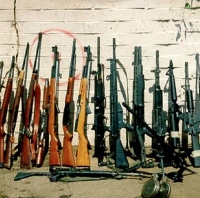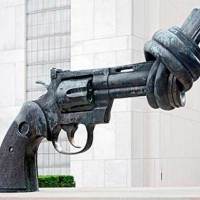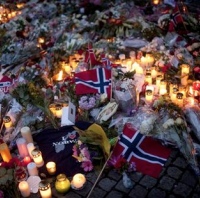- About Us
- Columns
- Letters
- Cartoons
- The Udder Limits
- Archives
- Ezy Reading Archive
- 2024 Cud Archives
- 2023 Cud Archives
- 2022 Cud Archives
- 2021 Cud Archives
- 2020 Cud Archives
- 2015-2019
- 2010-2014
- 2004-2009
 |
August 2011 - Time To End Our Gun-Dependence? |
Massacres such as that in Norway recently attract widespread attention and elicit cries of outrage. Part of the anguish expressed on such occasions arises from our apparent inability to prevent the repetition of such carnage. We hear theories about alienation and social dislocation, violent media and fantasy games, but refuse to face the underlying problem. Tragically, our gun dependence is killing us. Most appallingly, the gun dependence of a small minority slaughters everyone indiscriminately. When, in the past, I interviewed MPs about whether the concept of gendered policy issues was meaningful, one interviewee said that she never had to explain the need for gun control to women. The same could probably be said about the attitudes of a majority of men.
Recently, the New South Wales Shooters Party suggested that shooting be a more accessible activity for school students. The usual argument employed by shooters is that responsible firearm ownership makes everyone safer. An extension of the ‘guns don’t kill people’ mantra has it that serious shooters respect the power of the weapons in their hands. While these are fine sentiments, they are wishful thinking rather than assertions of objective fact. While firearms locked in cupboards do not rise up and begin shooting, their availability makes people with psychopathic tendencies instantly dangerous. As for the notion of responsible gun ownership, there is growing evidence that this is an oxymoron. Gun ownership per se encourages the use of guns in some context or another. Hunters push the boundaries of acceptable hunting. Criminals seize the weapons of armed security guards. Terrorists steal from military arsenals. The greater availability of firearms makes outrages of the recent sort more likely, if not inevitable.
Australians have always had an ambivalent attitude to the vicarious use of firearms by our military forces. The Anzac legend arose in an era when the notion of a just war might have made some sense but governments continue to exploit the legend to discourage discussion of not just military matters, but also defence and foreign policy. We have had a great number of inquiries into the culture of the military. The frequency of these inquiries suggests that either their terms of reference are too narrow to produce meaningful outcomes or that recommendations are being ignored. Sooner or later, we will be forced to face some uncomfortable realities about the military. Government leaders use high-sounding phrases about self-sacrifice, national defence and the profession of arms, but two facts are unavoidable. The first is that individual members of the military have chosen a career that assumes they are prepared to kill. The second is that most military operations are in essence, unnatural and sexist. Despite traditional tooth and claw arguments, the warrior enterprise arises not from any natural needs but from a masculine desire to dominate nature. It is no coincidence that military operations often threaten ecocide and little wonder women have such difficulties trying to have a military career.
The frequency of these inquiries suggests that either their terms of reference are too narrow to produce meaningful outcomes or that recommendations are being ignored. Sooner or later, we will be forced to face some uncomfortable realities about the military. Government leaders use high-sounding phrases about self-sacrifice, national defence and the profession of arms, but two facts are unavoidable. The first is that individual members of the military have chosen a career that assumes they are prepared to kill. The second is that most military operations are in essence, unnatural and sexist. Despite traditional tooth and claw arguments, the warrior enterprise arises not from any natural needs but from a masculine desire to dominate nature. It is no coincidence that military operations often threaten ecocide and little wonder women have such difficulties trying to have a military career.
Around the globe, men and guns create enormous problems, many of which endure for generations. Following the example of western governments which engage in costly arms races, dictatorial regimes in poor societies have an immediate justification for spending huge amounts of national capital on the military, thus impoverishing their countries and creating long lasting social problems. These problems create unrest which is repressed savagely, to the detriment of the long-term prospects for education, social cohesion and democratic politics.
These problems create unrest which is repressed savagely, to the detriment of the long-term prospects for education, social cohesion and democratic politics.
Worldwide also, anti-government forces and anarchic militias devastate local economies. Warlords make agriculture impossible by confiscating produce and murdering farmers. They undermine the families of ethnic enemies by raping women and destroying homes. They conscript the young to perpetuate their activities. While reporters’ voice-overs might blame one ethnic group or another in civil wars, the pictures convey another impression. Most scenes are dominated by the presence of two notable characteristics – the perpetrators are men and they usually carry guns.
In western societies we have acknowledged that the only effective way to address ‘domestic’ violence is for men to eliminate from their notions of masculinity the attitudes that give rise to such criminal cruelty. Surely, no man today would argue that being able to hit people has caused any crisis in his masculinity. Indeed, self-control and discipline have always been sure signs of strength, but increasingly these characteristics are being seen in combination with gentleness. Men themselves have benefited from the opportunity provided by changing attitudes to masculinity, for example by being more deeply engaged as parents than previous generations could be.
The same thinking should be applied to firearms ownership. It is a very frail concept of masculinity that would be damaged by denial of the right to have a gun. Males have the power to reduce if not entirely eliminate shootings and massacres by changing attitudes. Those guns in the hands of third world militias have most likely been dumped by ‘professional’ armies, sometimes in the form of material aid.  These supplies need to be shut off. Here, we should consider disarming private security guards and if necessary, putting more police personnel on patrol.
These supplies need to be shut off. Here, we should consider disarming private security guards and if necessary, putting more police personnel on patrol.
Most importantly, we need a serious review of the military. Indeed, when speaking of the military, we tend to use the language of defence, as though the two concepts were indistinguishable. Not only should we distinguish between them, but we should also consider the possibility that defence should have a less hairy-chested, less masculine, and less military form. Our insistence on arming ourselves for sport and on using the military for purposes which have dubious connection with national defence undermine efforts to eliminate massacres. It is no coincidence that there are large gaps between male and female attitudes to gun ownership and between male and female expectations about appropriate behaviour among military personnel. Men and guns are a dangerous mix. In the campaign against domestic violence, women identified the problem at the outset. Progress was slow until men took the initiative to change themselves and other men. Many women have identified the problems created by men with guns internationally and domestically but there will be no real progress until men ask whether firearms are an essential feature of their identities.
Tony Smith has written on defence and foreign policy issues in the Australian Quarterly, the Australian Review of Public Affairs, Eureka Street, Online Opinion and Unleashed.
